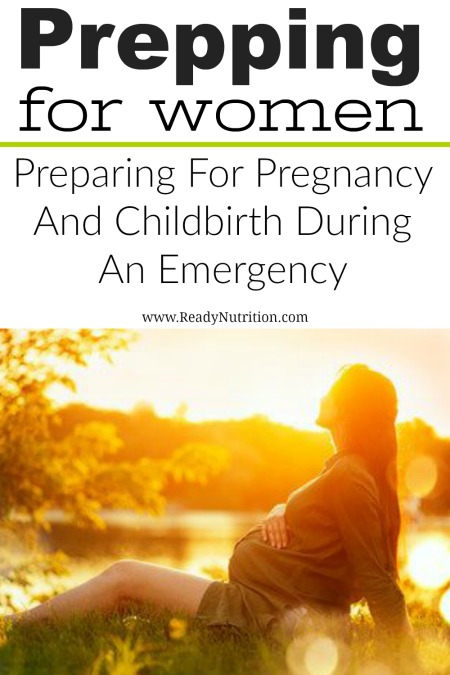Being pregnant when the SHTF or getting pregnant after could both be dangerous to the mother and the baby. But as women preppers, we will need to take this into account if we are of childbearing age so we can protect ourselves and our unborn child.
If you’ve ever been pregnant, you know how wonderful it can be. You also know there are things that can go wrong, and when you’re carrying your child in an extended or long-term emergency that’s the last you want! Arm yourself with knowledge and think ahead, in your preparedness, and you will be fine!
There’s a very real possibility that in a worst-case scenario, a doctor will be unavailable to help if something goes wrong with a pregnancy during an emergency like a terrible winter storm or any other type of grid down event. For this reason, our first suggestion to deal with pregnancy during a survival time is to learn. Read everything you can about pregnancy, what to expect at certain times during and how to know if there’s a problem. Making sure you and your unborn child are safe and healthy is the first line of defense. Most common pregnancy complications are:
- Swelling
- Stomach pain
- Dizziness
- Blurred vision
- Headaches
- Bleeding
But there is more to be aware of. Hit up your local library or peruse Amazon for some books about pregnancy. Dr. Bones and Nurse Amy have a great book to look into that covers a multitude of medical emergencies. Further, they have an in-depth podcast on the subject. Listen here.
Part of learning is knowing your personal body’s weakness. For example, when I was pregnant with my son, I always have very low blood pressure. I had such low blood pressure that I actually passed out after going into labor. These things are important to bear in mind when preparing. Understand the idiocracies of your body. If you haven’t been pregnant before, knowing what to expect will be much harder, but you can still read every bit of information you can and stock up on informative books if it gives you peace of mind.
In addition to learning and knowing your own body and risks, you should keep yourself in good shape. Giving birth is much easier if you have prepared your body for that. The American Physical Therapy Association has great advice to get a pregnant woman’s body ready for birth.
In addition to the aforementioned ideas, you should think about creating your own “birthing kit.” Even if you won’t be giving birth, if you’ve got one, you could be an enormous help to another mother and her baby. Helping others gives us purpose. We would like to give a special thank you to RN reader Jerry for his suggestion to add some of these items. A birthing kit could include the following:
- Pillows and blankets
- stethoscope, fetal and regular
- blood pressure cuff
- stopwatch (to measure contractions)
- stainless steel bowls
- towels
- antiseptic soap
- cleansing towelettes
- receiving blanket
- reusable baby diapers
- surgical gloves
- sterilized scissors/knife to cut the umbilical cord
- sterilized eye, throat, nose syringe
- garbage bags
- candles and a flashlight (in case there’s no power and a woman is giving birth during the night)
This list is not exhaustive, it’s just a suggestion and a starter kit.
Just keep in mind you’ll want to calm the mother down and maker her comfortable, as birth without drugs is not common in the United States anymore, and if you’re helping a first-time mother, she may not know just how painful this process can be. You can get an old duffle bag and just keep adding things to it if you’d like to build up your birthing kit over time. A separate “baby kit” can be made to help a mother after she gives birth. (We’ll touch on infant care after the SHTF in a future article.)
Pregnancy is not going to be easy if the worst case scenario happens and no doctors are readily available. But you can make the experience much more comfortable for yourself or the special woman in need of your help.
If you are pregnant or get pregnant after something happens, keeping your circle supportive will always be beneficial too. You won’t be able to move around as well toward the end of your pregnancy and you just might need a little help. Surround yourself with some good and loving family or friends who would be willing to help you too. Having support will show the pregnant woman that she is not forgotten. I know for a fact my mother in law would deliver a baby for me if need be, and as knowledgeable as she is, I would trust her to do so. Having people like that in your corner will go far especially if you expect to make it through a dire situation!
If anyone has any suggestions or books for our pregnant preppers or women who could possibly become pregnant on how to handle it, please leave your suggestions in the comments! Let’s share ideas and help each other out!
Read previous articles in this series:
Hygiene and Feminine Needs When Supplies Are Running Short
How To Handle Birth Control After The SHTF
Prepping For Women: How To Prepare MENTALLY When Our Brains Won’t Shut Off

This article was originally published at Ready Nutrition™ on May 28th, 2019








I read the Bradley Method birthing book when I was expecting my first. It focuses on natural/drug free childbirth. Knowing who your local midwives and midwife assistants are is also good thing.
Thanks for sharing this. I’m sure many couples like us will get benefitted from this article.